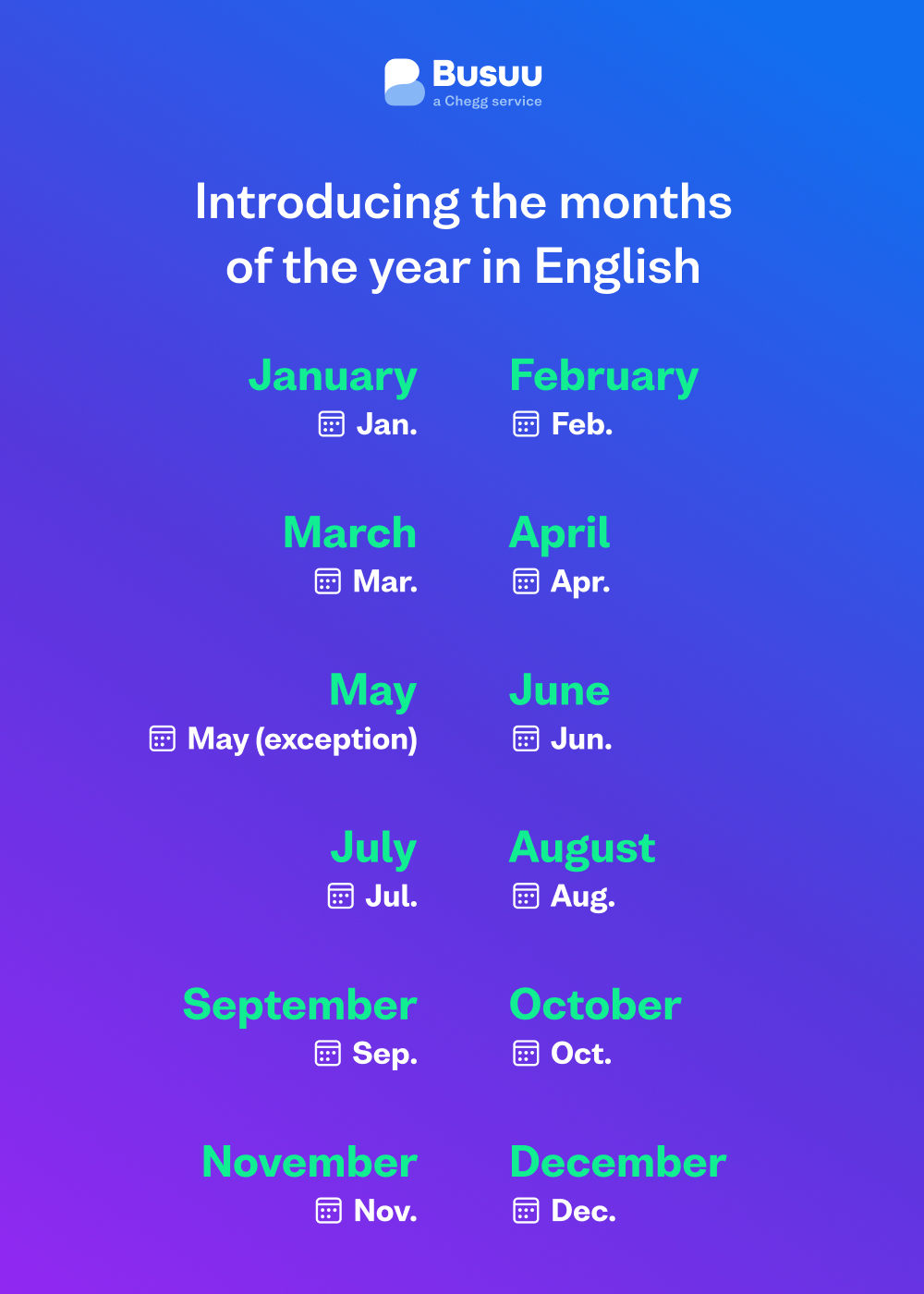Learn the Months of the Year in English
This article will help you remember the months of the year in English quickly.
I want to learn...
Ever wondered how to talk about the months in English? Well, you're in for a treat!
In this article, you will learn the different months in English. We will guide you through the pronunciation of each month, how to write them, and show you how to use them in everyday conversations.
Get ready to add a splash of flair to your English language skills as we explore the months together, from January, all the way to December!
What are the months of the year in English?
| Months | Abbreviation |
|---|---|
| January | Jan. |
| February | Feb. |
| March | Mar. |
| April | Apr. |
| May | May (exception) |
| June | Jun. |
| July | Jul. |
| August | Aug. |
| September | Sep. |
| October | Oct. |
| November | Nov. |
| December | Dec. |

What is the meaning of a leap year in English?
February is the shortest month with either 28 or 29 days, but what do we mean by a leap year?
The years that can be divided by four are called leap years. For example, the years 2024 and 2028 are leap years. In a leap year, the month of February will have an extra day, i.e., the month will have 29 days. This usually happens once every four years.
Now that we know about the 12 months of the year and understand the concept of a leap year, let’s try to memorize these 12 months with easy tricks.
Easy ways to remember the months of the year in English
There are many ways to learn and remember the months of the year quickly. Here, we have listed a couple of methods that will help you learn and remember the 12 months of the year in an easy way in chronological order.
The first tip to learn the months of the year is to divide these 12 months into a group of three months each and memorize the first letter of each month.
- January, February, March (J, F, M)
- April, May, June (A, M, J)
- July, August, September (J, A, S)
- October, November, December (O, N, D)
This trick will help you to memorize the months in chronological order quickly.
You can also learn the months of the year in English easily with the help of seasons:
- The months of December, January and February are three months in the winter.
- The next three months of March, April and May are three months of spring.
- June, July, and August are the months of summer.
- And the season of autumn occurs in the months of September, October, and November.
How did the months of the year get their names?
Knowing the story behind a particular month will help us remember it better. So, let’s see how these months got their names.
January
The month of January is named after Janus - the Roman God of beginnings, gates and doors.
February
The second month of the year, February, is named after an ancient Roman festival of purification called Februa.
March
If we talk about March, then this month is named after Mars, the Roman god of war.
Here’s a fun fact: The Roman calendar originally began in March, and the months of January and February were added later.
April
April takes its name from the Latin word aperire, meaning ‘to open.’
May
May is named after the Greek goddess Maia.
June
June is named after the Roman goddess Juno, who is believed to be the god of marriage and childbirth, and the wife of Jupiter, king of the gods.
July and August
July and August were named after two major figures of the ancient Roman world. July is the first month in the calendar that bears the name of a real person, rather than a deity. It is named after the statesman, Julius Caesar.
The month of August is named after Rome’s first emperor, Augustus.
September, October, November, and December
The last four months of the year September, October, November, and December are named after Roman numbers 7, 8, 9, and 10. They were originally the seventh, eighth, ninth, and tenth months of the Roman year.
How can we use English months when writing dates?
Now, let's talk about how to write dates using the months in English.
Month-Day-Year is the format used in the United States, whereas Day-Month-Year is used in the United Kingdom. In American English, the day and year are separated by commas, whereas in British English, there is no need for a comma after a date.
Examples:
- American: On July 10, 1913, the Earth's highest temperature was recorded.
- British: On 10th July, 1913, the Earth's highest temperature was recorded.
- American: 7/10 is July 10th (month-date-year).
- British: 7/10 is 7th October (date-month-year).
Asking questions about months in English
Here are a few examples of questions including months of the year, to give you an idea of how to structure them:
- What month of the year is it?
- What month is your birthday?
- What is your favorite month of the year? Why?
- Is this year a leap year?
- What month is Christmas?
But there are more than months to learn
Continue learning English with Busuu’s online courses to take your language skills to the next level with the help of our active community of native speakers.

